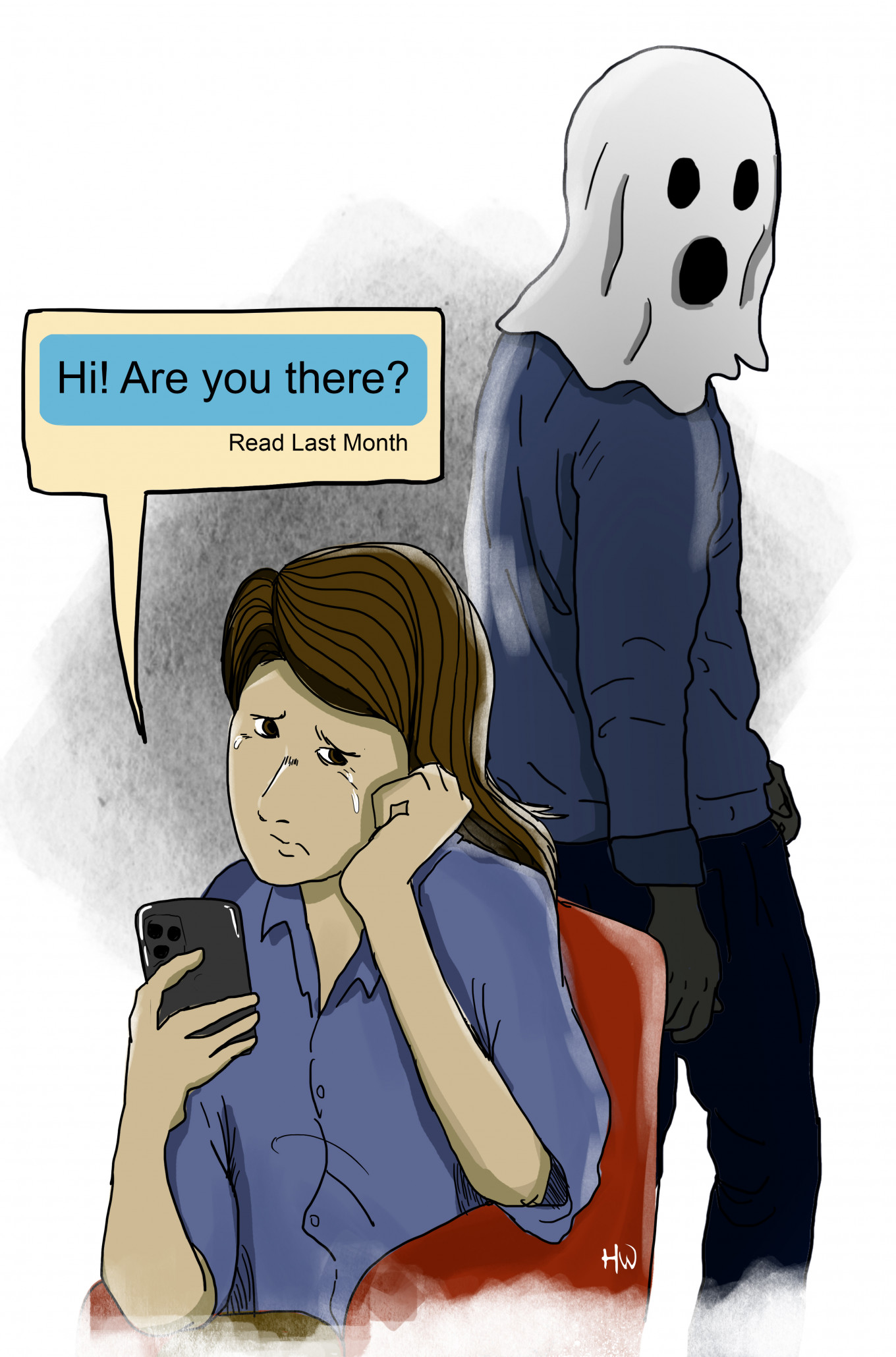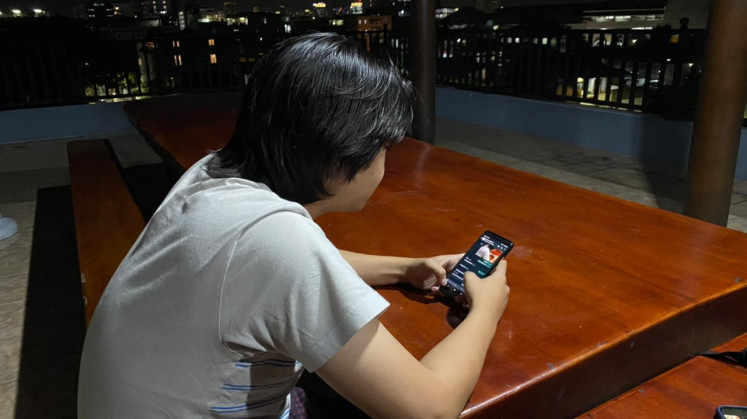Ghosting: Is the phenomenon of shutting people out acceptable?
In an age of unlimited communication methods, silence rings louder than ever before.
Change Size
 In an age of unlimited communication methods, silence rings louder than ever before. (JP/Illustration by Hengky Wijaya)
In an age of unlimited communication methods, silence rings louder than ever before. (JP/Illustration by Hengky Wijaya)
T
he gossip-laden breakup of President Joko Widodo’s youngest son, Kaesang Pangarep, with his girlfriend introduced “ghosting” to the mainstream. The term refers to the act of “disappearing” from someone’s life, ceasing all contact with that person without any explanation and typically ignoring any contact attempts.
While it is more common in personal relationships, “ghosting” also occurs in professional relationships.
During his days of looking for work, copywriter Ferdin was ghosted by potential employers.
“At first, [the companies] reached out by saying they were interested in my application. After the initial e-mail, they all went silent. Once, I even went through an interview where they said they would contact me within one or two weeks, but the same thing happened,” said the 23-year old. “I followed up with each of them and to this day, not one has replied.”
The “waiting game” as Ferdin calls it, made him anxious, frustrated and ultimately just annoyed. “I’d rather be informed that I wasn’t accepted than not getting any feedback. What’s so difficult about that?”
Krisna, 38, an architect from South Jakarta, experienced a form of ghosting from a sketch artist whom he had contacted to draw a picture of his late mother. This was back in May 2019, which was the second anniversary of her passing.
“The artist is a friend of a friend. So I thought it was all going to be all right,” he said.
The sketch was never finished. Until now, almost two years after the day of remembrance, there has not been any explanation from the artist.
The artist’s social media accounts remain active to this date, yet Krisna’s contact attempts have been ignored. At one point, Krisna asked a friend who is friends with the artist to reach out, but that, too, was to no avail.
Modern dating
Still, the term is more commonly associated with romantic relationships.
Fadly, a 27-year-old HR supervisor, has used dating apps since 2018, and is no stranger to both ghosting and being ghosted. To him, it’s just a part of modern dating that everyone is unfortunately familiar with by now.
“Honestly, it’s just something that’s bound to happen. You either do it to someone or someone’s gonna do it to you,” he said.
Fadly described an online rendezvous that turned into something he was not expecting. “I wasn’t looking for a relationship, so I reluctantly went radio silent on her,” admitted Fadly.
The differing expectations of potential couples (and those already in a relationship), Fadly feels, is the main reason why people resort to ghosting. Facilitated by the ease of using dating apps, we are always on the lookout for the next potential match, he says.

Fadly also noticed a shift in how he views relationships the more he used dating apps. “I used to view sex as something sacred that you only do with someone you love, but then I learned that you can get it through texts alone—you don’t even need to invest time and emotions. What I expected from getting to know someone has new shifted over time,” said Fadly.
As to how being ghosted makes him feel, Fadly said, the worst part was the sense of inadequacy it instilled.
Fadly said that ghosting someone always made him feel terrible. “At some point, I noticed, ‘why have I become like this?’” It’s one of the reasons he stopped using dating apps in late 2020.
Speaking from his educational background in psychology, Fadly cited Erik Erikson’s Stages of Psychosocial Development, which identifies stages of life that an individual would go through. In each stage of life, there are contrasting forces of psychosocial crisis that an individual must negotiate—the results of which will shape one’s character. In young adults, where the psychosocial crisis is between intimacy and isolation, a failure to form intimate relationships could lead to a sense of isolation from the world.
Mario, 30, a creative worker, admitted that in his younger days, being ghosted would make him feel terrible, and it took a while for him to work on himself to be less anxious when it comes to dating.
“I’ve never ghosted anyone, because I know what it feels like. Instead, I would just say, ‘Hey, this is a mistake. We should not see each other again’ or ‘You’re just not my type.’ They will probably get hurt for 15 minutes, but then they will move on,” he said.
Those who ghost
Soni, 30, who works at a law firm in Denpasar, ghosts a lot of men whom he has dated. Since the beginning of this year, around seven guys had already been on the receiving end of this, he said.
For Soni, ghosting happens when he does not feel comfortable with someone but at the same time telling them the truth seems like a daunting task.
“I feel relieved, mostly. Sometimes I feel a bit bad, but mostly I’m glad”,” said Soni of ghosting.
While admitting that ghosting is wrong, Soni did not feel like changing his habit, even after one particular person confronted him about it.
“I don’t feel like I have the obligation to clarify something that is never there. There’s no feeling, so let’s just be strangers again,” he said.
Anna, 33, a marketing specialist, ghosted people a few times—two times because the people involved emotionally abused and exploited her, while others came from her own guilt and self-criticism.
While she did not enjoy it, continuing a charade and getting into conflict would be unbearable for her.
“It’s more about avoiding feeling bad than hurting people,” she said.
Despite the anxiousness and guilt that come with ghosting—even when she feels they deserve it—Anna said at least the unpleasantness was self-inflicted.
“You can’t be disappointed by others if you don’t show up,” said Anna.”
Reflecting Anna’s sentiment, Soni added that he did have an avoidance issue.
“When I see [a] potential partner loses interest in me, or when I become overly attached to them, I leave them [...] I avoid the time when they leave me and hurt me, so I do it to them first,” he said.
Both Anna and Soni have also experienced being ghosted themselves.
Soni would feel a little disappointed and annoyed by it, but in the end, he would understand and just move on.
“Maybe they have the same issues as me,” he shrugged.









